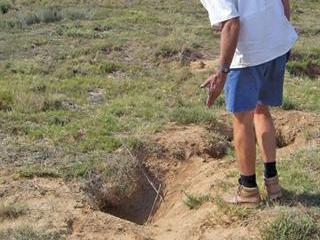The cold front that passed over the country over the Last few days of August and on Spring Day is not unusual for this time of year, particularly when taking into account the weather over this period in previous years, said Johan van den Berg, Santam Agri’s product development manager. “The first week of September is notorious for frost and most farmers wait until after this time to start planting the following season’s crops,” explained Van den Berg.
He added that when this type of weather occurs in the second half of September, the amount of damage caused is often far greater. “Very few livestock losses occurred this year because of the absence of rain. A combination of low temperatures, strong winds and rain are usually lethal to livestock, especially sheep and Angora goats. One of the more serious consequences of cold fronts at this time of the year is the associated very strong winds, which cause favourable conditions for runaway veld fires.” e said that the damage caused by frost is probably only a fraction of the damage caused by fire, to livestock and other assets.
Fire is regarded as a secondary effect of the cold front as at this time of the year the grass is very dry and combustible. “The onset of winter this year was later than usual and the first real frost only occurred in the second part of June,” said Van den Berg. “This is more than a month later than usual and can be attributed to a La Nina phenomenon usually responsible for above-normal rainfall in autumn and eventually resulting in a late start to winter and a late end to winter. Cold spells as late as October and even later are not uncommon.” – Peter Mashala
Hurricane Gustav could affect grain prices
Hurricane Gustav, which has tormented PARTS OF South America and the southern states of the US, could disrupt oil prices and grain supply, raising the grain price. At certain stages Hurricane Gustav strongly resembled Katrina, which devastated the city of New Orleans in Louisiana in 2005. At one stage it was a Category 4 storm and led to the evacuation of amidst fears of a repeat of the Katrina disaster.
At the time of going to print Gustav had killed more than 80 people in the Dominican Republic, Haiti and Jamaica, and oil production platforms were shut down in the Gulf of Mexico. According to Louis Botha, a meteorologist at Grainvest, the disruption in oil production could have an adverse effect on the oil price, which could in turn lead to higher grain prices. “It all depends on the extent of the damage to the platforms, but in general oil companies are better prepared than they were in 2005,” said Botha. DF F yfer, head of PSG Commodities, believes the strategic oil reserves in the US could be enough to counter any supply-side disruptions and thus ensure that the price doesn’t rise. The transport of grain on floating barges down the Mississippi River could be affected for a few days and have a an impact on supply
. The political situation and upcoming presidential elections in the will also move the government to exercise more influence over the oil price. n the long term however, “the hurricane will be good for grain production and not good for prices,” said Fyfer. “The hurricane brought a lot of moisture into the delta and will lead to good rainfall in the western and eastern corn belts.” – Drieka Burger
A perfect time for the diesel-price reduction
The September reduction of between R1,44/â„“ and R1,63/â„“ in the diesel price comes at the perfect time because maize farmers will start planting preparations after the first rain in October, says Ferdinand Meyer, senior lecturer at the Bureau for Food and Agricultural Policy at the University of Pretoria. High diesel prices haven’t affected producers too much to date, but it takes between 100â„“ and 150â„“ of diesel to establish 1ha of maize. With an average reduction in the diesel price of between 12% and 14%, South African producers could save roughly R540 million on diesel to establish about 2,8 million hectares of maize. “We are obviously very pleased with the reduction in the diesel price,” said Neels Ferreira, chairperson of Grain SA.
He estimated that the new price could save grain producers R160/ha in production costs. “I am worried the new price will be short-lived, as crude oil prices have already started to increase,” he added. “It might be a good idea for producers to fill their tanks this month.” C orné Louw, an agricultural economist at Grain SA, said that establishing summer grains requires 28â„“/ha of diesel. If the diesel price is at R1,44/â„“ that translates into a R40/ha saving.
This means that the total-production diesel input is 80â„“/ha, so if the price stays the same it will translate into a R115/ha savings at current prices. “But there has been Hurricane Gustav (see story above) in the Pacific, and oil prices have already started to increase as a result, so the total effect on production costs can’t be predicted with any level of certainty,” he explained. “The fuel prices is bound to change again.” Louw agreed with Ferreira that filling up diesel-storage units on farms to capacity in September could be a good strategy.
Mike Schüssler an economist at TSec said that short-term oil prices could be volatile. He also mentioned Hurricane Gustav, but added that medium-term prices should move sideways over the next few months, with a slight increase towards the end of the year. – Wouter Kriel









